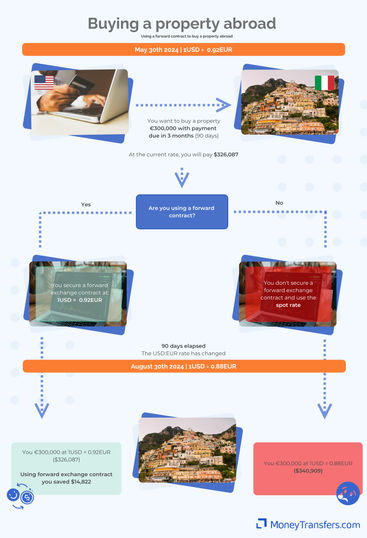What is a Forward Exchange Contract?
A forward exchange contract is a way to exchange currencies at a fixed price on a future date. With it, you can set the exact cost of your money transfer in advance, so you don’t have to worry about rate changes. This guide will explain everything you need to know.
Search Now & Save On Your Transfer
Forward contracts explained
A forward contract is an agreement to make a trade (such as converting currencies) at a future date with the cost of that transaction being agreed beforehand.

Forward contracts are made between two parties without the need for another organization (such as an exchange or clearing house) to act as an intermediary.
The absence of an intermediary makes a forward contract an over-the-counter (OTC) instrument, which is customizable so that both parties agreeing with the trade are happy with the terms.
Most commonly used for trading commodities, forward contracts are also a popular mechanism with which to exchange currencies.
Is there a difference between a forward contract and a forward exchange contract?
A forward exchange contract is the term used to describe a forward contract specifically for a currency exchange, so there’s no real difference between the two.
A forward exchange contract is a forward contract by which an individual or business commits to buying a specific amount of foreign currency at an agreed date in the future, with the exchange rate applied to the transaction agreed in advance.
The rate of the exchange is set at the time that the contract is entered into, and the currency pair being traded constitutes the contract’s underlying asset.
In the case of money transfers, a forward exchange contract has four components:
Asset type: The currency that is specified to be purchased, for example, GBP/USD.
Asset quantity: The amount of that currency.
Settlement date: The pre-specified date of purchase.
Price: The pre-specified exchange rate applied to the currency pairing.
Risks and benefits of using forward exchange contracts
A forward exchange contract eliminates uncertainty by locking in the price of exchange in advance.
While eliminating the risk of loss should the exchange rate move in an unfavorable direction, this protection also eliminates the possibility of gain should it move the other way.
Here is a breakdown of the pros and cons of trading using forward contracts:
Pros
Cons
When it matters... for you?
There are a variety of situations in which forward contracts can be helpful, as it can be useful to know exactly how much something will cost in advance - particularly when working on a tight budget.
Here are some situations in which you might want to consider a forward contract:
Making a large purchase abroad
When buying something expensive, such as a holiday home, a forward contract can help you ensure that you can afford the cost even if the exchange rate moves in the future.
Sending a large amount to family or friends overseas
Paying bills in another country
International business expenses
Planning a life event abroad such as a wedding
If you’re looking to profit off exchange rate fluctuations
How do forward exchange contracts work?
Taking a look at a forward exchange contract, we can see how forward contracts can be used to fix the price and settlement date of a currency exchange in advance.
This example will guide you through how it works.
Practical example: Buying a home in Italy from the US
Suppose you intend to purchase property abroad. You have chosen a town in Italy, and your agent in the region tells you that it can take up to eight weeks to complete a transaction.
At the current exchange rate, your budget is just enough to cover the average price of a property in your chosen area.
You believe, however, that over the coming months, ongoing economic events will cause the Euro to strengthen against the US Dollar.
If this were to happen, your budget would effectively decrease before you’ve had the opportunity to complete a purchase and you might be priced out of buying the property.
To protect your budget, you can take out a forward contract and lock in the current rate of exchange for the USD to Euro pairing.
This ensures that the money you have available is not at risk of decreasing over time due to changes in the rate while you search for a property that you wish to buy.

There is the possibility that the exchange rate could move in the opposite direction after you have agreed to your forward contract.
If this were to happen, you’d still be locked into paying the exchange rate you previously agreed and you would end up spending more money than you would have needed to.
A forward contract will always run this risk, but it allows you to be certain that you can make your purchase regardless of market movements.
Taking out a forward exchange contract
In recent years, money transfer brokers have sprung up on the internet and are now able to offer all the services that previously could only be accessed with banking institutions - including forward exchange contracts.
Banks still offer the ability to take out forward exchange contracts, but are often more expensive, take longer, and have more T&Cs to get it working.
Here's a quick comparison of making a transfer via a money transfer provider vs a bank:
Money Transfer Company | Bank | |
|---|---|---|
Amount Sent | $1000 | $1000 |
Exchange Rate | €0.8407 | €0.910207 |
Fees | $0 | $5 |
Amount Received | €924.50 | €905.20 (€23 less) |
Want to Benefit From Locked Exchange Rate?
Whether or not a currency exchange is possible depends on the sending and disbursing network of the money transfer company.
A forward exchange contract is possible if a money transfer company supports the currency pairing for that exchange.
With the variety of money transfer providers around, you can usually find forward contracts offered for any currency pairing, but you might have to spend some time searching if you’re exchanging between two lesser-used currencies.
A bit more on forward contracts
Can forward exchange contracts be used for any currency pair?
Can I cancel a forward exchange contract?
What is hedging with forward contracts?
What’s the difference between a Forward Contract and Futures Contract?
Recapping on forward exchange contracts
A forward exchange contract allows you to lock the cost of your transfer for a given currency at a given date.
It's useful when you know the date you'll need to make a large transfer and believe the exchange market will move in your favor.
If you’re looking to arrange a forward exchange contract, then your best option is to compare the various money transfer companies that can provide them.
Simply use the form below, and we’ll show you your best options in a matter of seconds.
Lock Your Transfer Rate Today
Sources & Further Reading
Related Content


Contributors

Jonathan Merry





